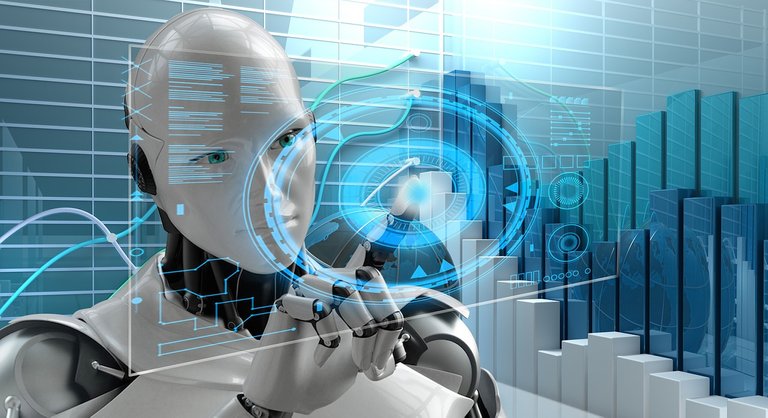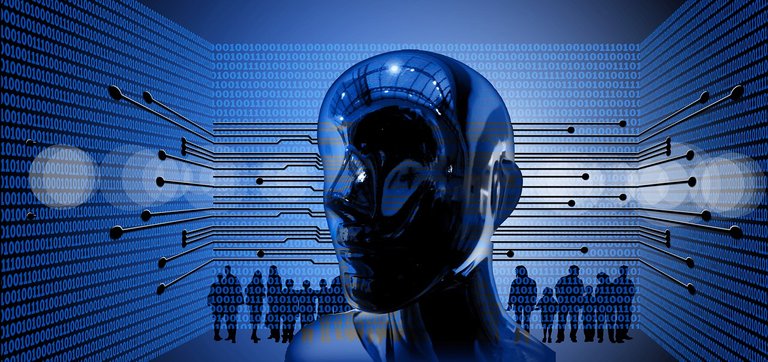To be a responsible citizen of the 21st Century requires a new kind of civic awareness rooted in greater scientific and technological literacy.
The full essay, "Will Robots Want to Vote? An Investigation into the Implications of Artificial Intelligence for Liberty and Democracy," was written as part of a fellowship for The Fund for American Studies Robert Novak Journalism Program. For an introduction to the premise of the project, please read my speech, Will Robots Want to Vote? For an introductory summary to the final essay, please read, This will begin to make things right. The project is presented as a multi-part series. This piece is the final installment. Please see the related posts linked at the bottom of this essay to read more of the project. If you liked this post, please consider sharing, commenting, and upvoting. Thank you in advance. - Josh ---
Conclusions
The convergence of a populist anxiety aimed against immigrants, elites, technological automation, and the technical systems that favor the spread of strong emotions, has created a situation much more toxic than future technological unemployment.
While leading experts rush to designate the latest technological innovations as the beginning of the Fourth Great Industrial Revolution, they still find their beginnings in the political and economic innovations of the First Industrial Revolution in the 17th and 18th centuries, and might even be considered their logical outcome.
Policy shifts motivated by technological progress would still be consistent with the dynamics of a democratic system as it balances the competitive interplay between economic innovation and bureaucratic regulations.
Even current dynamics of the online press find their roots in the American Founding Era, as history suggests the news industry's 20th century one-size-fits-all business model is an anomaly. The economics of industrialized mass production favored the rise of the mass media.
But in the era of the Internet, hyper-partisanship fueled by hyper-personalization reigns supreme. The competitive dynamics of niche-marketing favored by the Internet work well when selling goods or services, but viral politics is further complicated by the noise of high velocity propaganda.
Combating these effects will require a new kind of civic awareness that goes well beyond knowing how a bill becomes a law, or even digital media literacy. Promoting a culture of algorithmic transparency and literacy would pay dividends by empowering citizens with the knowledge and tools necessary to rediscover their humanity in a world pushing them to merge with machines.
Algorithms, while not patentable, are protected trade secrets, and so any push towards greater transparency has inevitably met resistance. Encouraging greater literacy in science, technology, engineering, and mathematics (STEM) will help to create a culture of greater algorithmic literacy.
Much like studying the arts and humanities can increase a person's visual literacy to interpret films, television, and advertisements, or in the way studying rhetoric can help a person understand political speeches and the news media, studying STEM can help a person better understand the influence of algorithms and computational propaganda. STEM education is no longer just a prerequisite for a high paying job in the tech sector. It is vital for the functioning of a free society in the age of machines and cyborgs.
---
Adaptation
The corporate world, and particularly Silicon Valley, have supported a heavy push towards learning to program and greater STEM literacy. But fundamentally, the ability to learn and adapt addresses the root of current technological anxieties because it is not about knowing a certain knowledge base, but about the ability to acquire new knowledge and skillsets when needed.
Our adaptability is one of our greatest strengths as a species, and empowering people by helping them improve their own learning abilities is crucial to shoring up our own adaptability as a civilization and as a species.
There are already efforts underway to use A.I. to best determine optimal resource allocation -- breakthroughs in applications in finance, medicine, agriculture, environmental protection, and security are also promising - enabling better health and more prosperity.
But rather than allowing these technologies to overwhelm us in the political realm, we can also use them to help us defend our economic and political liberties. Last year exposed their weaknesses, and showcased their strengths. The efforts of tech giants such as Google and Facebook are a start, but we can also learn how to defend ourselves.
By using A.I. to filter through mountains of data at lightning speed, we can empower ourselves to combat computational propaganda and better discern the truth in a world of high speed fictions.
---Thank you for reading,
- Josh
---Further Reading
* Blunt, Katherine. "Oil producers turn to artificial intelligence for efficiency." Houston Chronicle. April 19, 2018. Accessed April 19, 2018. https://www.chron.com/business/energy/article/Oil-producers-turn-to-artificial-intelligence-for-12845692.php.
* Branch, Glenn. "Artificial intelligence will put premium on physicians' knowledge, judgment." STAT. April 19, 2018. Accessed April 19, 2018. https://www.chron.com/business/energy/article/Oil-producers-turn-to-artificial-intelligence-for-12845692.php.
* Delgado, Rick. "Artificial Intelligence in Healthcare: Major Opportunities and Challenges" SmartDataCollective. June 15, 2017. Accessed April 19, 2018. https://www.smartdatacollective.com/artificial-intelligence-healthcare-major-opportunities-challenges/.
* Garcia, Ecatarina. "The Artificial Intelligence Race: U.S. China and Russia." Modern Diplomacy. April 19, 2018. Accessed April 19, 2018. https://moderndiplomacy.eu/2018/04/19/the-artificial-intelligence-race-u-s-china-and-russia/.
* Gershgorn, Dave. "Artificial intelligence can scour code to find accidentally public passwords." Quartz. April 18, 2018. Accessed April 19, 2018. https://qz.com/1255005/artificial-intelligence-can-scour-code-to-find-accidentally-public-passwords/.
* Hu, Cherie. "How Music Generated by Artificial Intelligence Is Reshaping -- Not Destroying -- The Industry." Billboard. April 19, 2018. Accessed April 19, 2018. http://www.post-gazette.com/news/nation/2018/04/19/As-Facebook-embraces-artificial-intelligence-tools-will-it-further-spook-consumers/stories/201804110278/.
* Johnson, Tim. "As Facebook embraces artificial intelligence tools, will it further spook consumers?" McClatchy DC. April 19, 2018. Accessed April 19, 2018. http://www.post-gazette.com/news/nation/2018/04/19/As-Facebook-embraces-artificial-intelligence-tools-will-it-further-spook-consumers/stories/201804110278/.
* McLaughlin, Jenna. "The Robots Will Run the CIA, Too" McClatchy DC. September 07, 2017. Accessed April 19, 2018. https://foreignpolicy.com/2017/09/07/the-robots-will-run-the-cia-too/.
* Metz, Cade. "A.I. Researchers Are Making More Than $1 Million, Even at a Nonprofit." The New York Times. April 19, 2018. Accessed April 19, 2018. https://www.nytimes.com/2018/04/19/technology/artificial-intelligence-salaries-openai.html.
* Morrow, Alison. "Endangered orcas helped by Artificial Intelligence." K5 News. April 19, 2018. Accessed April 19, 2018. http://www.king5.com/article/news/local/endangered-orcas-helped-by-artificial-intelligence/281-543322605.
---Related Posts by Josh Peterson
* "Rediscovering Our Humanity in the Age of Algorithms and Bots." Steemit. January 29, 2018. Accessed April 19, 2018. https://steemit.com/writing/@joshpeterson/rediscovering-our-humanity-in-the-age-of-algorithms-and-bots
* "Revenge of the Cyborgs." Steemit. December 21, 2017. Accessed January 28, 2018. https://steemit.com/artificial-intelligence/@joshpeterson/the-revenge-of-the-cyborgs
* "Robot Law." Steemit. November 6, 2017. Accessed December 20, 2017. https://steemit.com/artificial-intelligence/@joshpeterson/robot-law
* "Raging Against the Machines." Steemit. October 27, 2017. Accessed November 2, 2017. https://steemit.com/artificial-intelligence/@joshpeterson/raging-against-the-machines
* "The Rise of the Machines Has Already Happened." Steemit. October 25, 2017. Accesed November 6, 2017. https://steemit.com/artificial-intelligence/@joshpeterson/the-rise-of-the-machines-as-a-historical-metaphor
* "Rethinking Artificial Intelligence." Steemit. October 22, 2017. Accessed October 24, 2017. https://steemit.com/artificial-intelligence/@joshpeterson/rethinking-artificial-intelligence
* "This will begin to make things right." Steemit. October 22, 2017. Accessed October 22, 2017. https://steemit.com/writing/@joshpeterson/this-will-begin-to-make-things-right.
* "Will Robots Want to Vote?" Steemit. October 19, 2017. Accessed October 22, 2017. https://steemit.com/artificial-intelligence/@joshpeterson/will-robots-want-to-vote.
---View Post History
